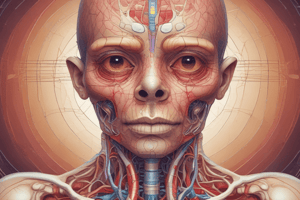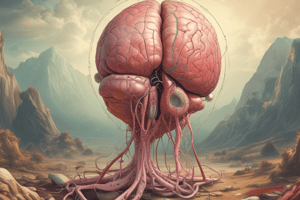Podcast
Questions and Answers
What percentage of the adrenal gland is made up of the adrenal cortex?
What percentage of the adrenal gland is made up of the adrenal cortex?
- 20%
- 50%
- 80% (correct)
- 100%
Which layer of the adrenal cortex is the outermost?
Which layer of the adrenal cortex is the outermost?
- Zona fasciculata
- Zona glomerulosa (correct)
- Adrenal medulla
- Zona reticularis
Which hormone is primarily responsible for mineralocorticoid activity?
Which hormone is primarily responsible for mineralocorticoid activity?
- Epinephrine
- Testosterone
- Cortisol
- Aldosterone (correct)
What is a primary function of aldosterone?
What is a primary function of aldosterone?
During hypersecretion of aldosterone, what is the expected sodium loss through urine?
During hypersecretion of aldosterone, what is the expected sodium loss through urine?
Which of the following actions does aldosterone NOT perform?
Which of the following actions does aldosterone NOT perform?
What byproduct is formed when corticosteroids are degraded in the liver?
What byproduct is formed when corticosteroids are degraded in the liver?
What condition can result from hyposecretion of aldosterone?
What condition can result from hyposecretion of aldosterone?
What process is responsible for the uptake of tyrosine into chromaffin cells of the adrenal medulla?
What process is responsible for the uptake of tyrosine into chromaffin cells of the adrenal medulla?
Which enzyme is responsible for converting tyrosine into dihydroxyphenylalanine (DOPA)?
Which enzyme is responsible for converting tyrosine into dihydroxyphenylalanine (DOPA)?
What percentage of noradrenaline is taken up by sympathetic adrenergic neurons?
What percentage of noradrenaline is taken up by sympathetic adrenergic neurons?
What is the end product of the oxidation of metanephrines by monoamine oxidase (MAO)?
What is the end product of the oxidation of metanephrines by monoamine oxidase (MAO)?
Which form does the majority of catecholamines get removed from the body through urine?
Which form does the majority of catecholamines get removed from the body through urine?
How does adrenaline primarily exert its effects on target organs?
How does adrenaline primarily exert its effects on target organs?
What is considered the most important enzyme for the methylation of noradrenaline into adrenaline?
What is considered the most important enzyme for the methylation of noradrenaline into adrenaline?
What happens to adrenaline and noradrenaline in terms of metabolic action?
What happens to adrenaline and noradrenaline in terms of metabolic action?
What primary condition leads to the pigmentation of skin and mucous membranes due to excess ACTH secretion?
What primary condition leads to the pigmentation of skin and mucous membranes due to excess ACTH secretion?
What is a significant test for diagnosing Addison Disease?
What is a significant test for diagnosing Addison Disease?
Which symptom is NOT typically associated with an Addisonian crisis?
Which symptom is NOT typically associated with an Addisonian crisis?
What causative factor can induce an Addisonian crisis?
What causative factor can induce an Addisonian crisis?
What is typically true about congenital adrenal hyperplasia regarding cortisol secretion?
What is typically true about congenital adrenal hyperplasia regarding cortisol secretion?
What causes the adrenal cortex to increase in size in congenital adrenal hyperplasia?
What causes the adrenal cortex to increase in size in congenital adrenal hyperplasia?
What enzyme deficiency primarily affects cortisol synthesis in congenital adrenal hyperplasia?
What enzyme deficiency primarily affects cortisol synthesis in congenital adrenal hyperplasia?
Which of the following symptoms would likely NOT be associated with cortisol deficiency?
Which of the following symptoms would likely NOT be associated with cortisol deficiency?
What is the primary catecholamine found in the granules of chromaffin cells?
What is the primary catecholamine found in the granules of chromaffin cells?
Which of the following conditions can stimulate the secretion of stored catecholamines from chromaffin cells?
Which of the following conditions can stimulate the secretion of stored catecholamines from chromaffin cells?
Pheochromocytomas primarily arise from which type of cells?
Pheochromocytomas primarily arise from which type of cells?
What is a key symptom associated with pheochromocytomas?
What is a key symptom associated with pheochromocytomas?
Where are chromaffin cells also located besides the adrenal medulla?
Where are chromaffin cells also located besides the adrenal medulla?
What type of neurons provide the innervation to the adrenal medulla?
What type of neurons provide the innervation to the adrenal medulla?
Which of the following tumors is considered similar to pheochromocytomas?
Which of the following tumors is considered similar to pheochromocytomas?
Chromaffin cells can be identified due to their affinity for which element?
Chromaffin cells can be identified due to their affinity for which element?
What primary effect does adrenaline have on heart rate?
What primary effect does adrenaline have on heart rate?
Which receptor is primarily responsible for the vasoconstrictor effect of noradrenaline on blood vessels?
Which receptor is primarily responsible for the vasoconstrictor effect of noradrenaline on blood vessels?
How does adrenaline affect diastolic blood pressure?
How does adrenaline affect diastolic blood pressure?
Which of the following statements about catecholamines is true?
Which of the following statements about catecholamines is true?
Which type of adrenergic receptor is involved in increasing the force of contraction of the heart?
Which type of adrenergic receptor is involved in increasing the force of contraction of the heart?
What is the effect of noradrenaline on systolic blood pressure?
What is the effect of noradrenaline on systolic blood pressure?
How do adrenaline and noradrenaline differ in their effects on blood vessels?
How do adrenaline and noradrenaline differ in their effects on blood vessels?
Which statement accurately reflects the role of glucocorticoids in relation to catecholamines?
Which statement accurately reflects the role of glucocorticoids in relation to catecholamines?
Flashcards are hidden until you start studying
Study Notes
Adrenal Gland Structure
- Composed of two main parts:
- Adrenal cortex (80% of the gland)
- Adrenal medulla (20% of the gland)
Histology of Adrenal Cortex
- Adrenal cortex consists of three distinct layers:
- Outer zona glomerulosa
- Middle zona fasciculata
- Inner zona reticularis
Hormones of Adrenal Cortex
- Adrenocortical hormones are steroid-based (corticosteroids)
- Classified into three groups:
- Mineralocorticoids
- Glucocorticoids
- Sex hormones
Fate of Corticosteroids
- Primarily degraded in the liver
- Conjugated to form glucuronides and sulfates
- Approximately 25% excreted in bile and feces, 75% in urine
Mineralocorticoids
- Regulate minerals (electrolytes) such as sodium and potassium
- Key mineralocorticoids:
- Aldosterone
- 11-deoxycorticosterone
- Secreted by zona glomerulosa of the adrenal cortex
Functions of Aldosterone
- Increases sodium reabsorption, potassium excretion, and hydrogen secretion in renal tubules
- In cases of hypersecretion, minimal loss of sodium occurs; in hyposecretion, sodium loss increases significantly (hypernatriuria)
Cortisol Deficiency Effects
- Excess ACTH secretion leads to pigmentation of skin and mucous membranes
- Symptoms include:
- Muscular weakness
- Dehydration and sodium loss
- Hypotension
- Decreased cardiac output
- Hypoglycemia
- Nausea, vomiting, diarrhea
- Increased susceptibility to infections
- Difficulty handling stress (Addisonian crisis)
Tests for Addison Disease
- Blood tests for cortisol and aldosterone levels
- Urine steroid excretion measurement
Addisonian Crisis
- Characterized by sudden collapse with an increased need for glucocorticoids
- Can be triggered by:
- Mild stress
- Fasting-related hypoglycemia
- Trauma
- Surgery
- Withdrawal from glucocorticoid therapy
Congenital Adrenal Hyperplasia
- Congenital disorder leading to increased adrenal cortex size due to increased steroid-secreting cells
- Caused by enzyme deficiencies (e.g., 21-hydroxylase) leading to decreased cortisol but increased ACTH, causing hyperplasia
Catecholamine Synthesis
- Tyrosine uptake and conversion into catecholamines occur in chromaffin cells of the adrenal medulla:
- Tyrosine to DOPA (by tyrosine hydroxylase)
- DOPA to dopamine (by DOPA decarboxylase)
- Dopamine to noradrenaline (by dopamine beta-hydroxylase)
- Noradrenaline to adrenaline (by phenylethanolamine N-methyltransferase)
Metabolism of Catecholamines
- 85% of noradrenaline taken up by sympathetic adrenergic neurons
- Remaining 15% metabolized into:
- Meta-adrenaline (via COMT)
- Vanillylmandelic acid (VMA, via MAO)
- Catecholamines are excreted in urine as:
- Free adrenaline and noradrenaline (15%)
- Meta-adrenaline and meta-noradrenaline (50%)
- VMA (35%)
Actions of Adrenaline and Noradrenaline
- Stimulate nervous system with significant metabolic and cardiovascular effects
- Bind to adrenergic receptors in target organs, with two main types:
- Alpha-adrenergic receptors (α1, α2)
- Beta-adrenergic receptors (β1, β2)
Effects on Heart and Blood Vessels
- Adrenaline (via beta receptors) increases:
- Heart rate
- Force of contraction
- Excitability and conductivity of the heart
- Noradrenaline acts as a general vasoconstrictor via alpha receptors, increasing total peripheral resistance
- Adrenaline causes vasodilation in skeletal muscle, liver, and heart via beta-2 receptors, decreasing total peripheral resistance
Blood Pressure Regulation
- Adrenaline raises systolic blood pressure while lowering diastolic pressure
- Noradrenaline increases both systolic and diastolic pressures due to vasoconstriction effects
Chromaffin Cells
- Found in adrenal medulla and sympathetic nervous system sites
- Release catecholamines during stress or excitement
Pheochromocytoma
- Rare tumors of chromaffin cells in adrenal medulla or extra-adrenal sites
- More common in women, occurring at any age but rare over 60
- Symptoms include sustained or episodic hypertension, pallor, anxiety, and cardiac arrhythmias
Studying That Suits You
Use AI to generate personalized quizzes and flashcards to suit your learning preferences.



